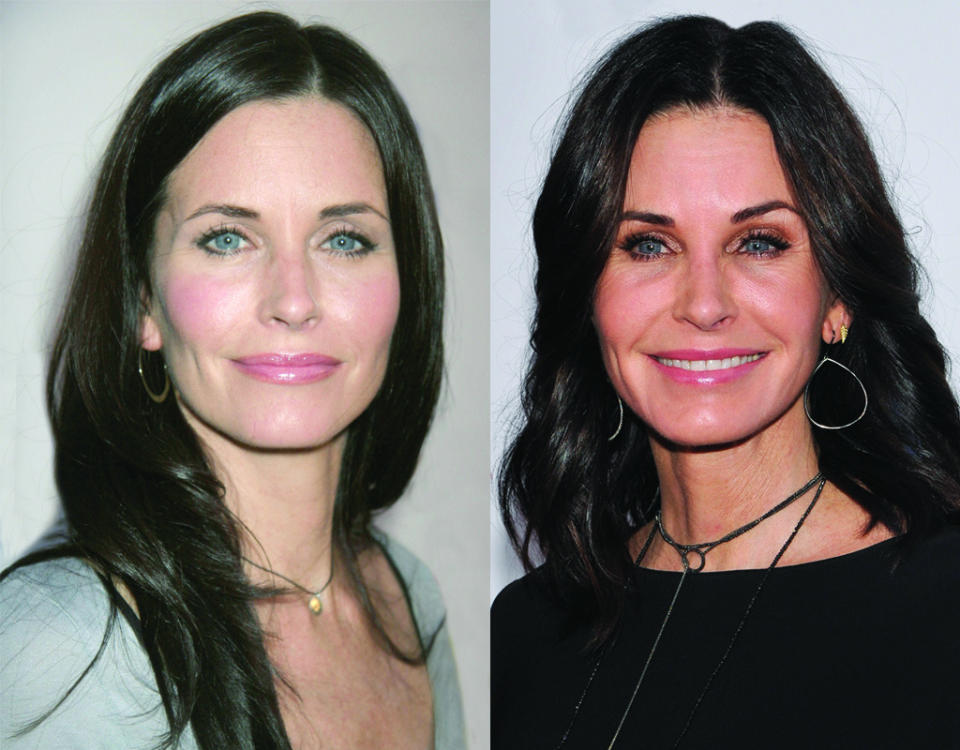Courteney Cox Regrets Her Plastic Surgery

Courteney Cox admits that she regrets having plastic surgery and has now adopted the motto “just let it be.” (Photo: Getty Images)
Courteney Cox has had to endure aging in the most public way possible, starting on one of the most beloved sitcoms of all time, in front of millions of viewers, and then under a spotlight that followed her afterward. When Friends ended, you might have noticed some changes to her physical appearance — changes she now regrets, according to an appearance on a new episode of Running Wild With Bear Grylls.
During her Ireland adventure with Grylls, the actress admits to having cosmetic procedures she regrets in an effort to turn back the hands of time. “I think there’s a pressure to maintain [your looks], not just because of fame, but just, you know, being a woman in this business,” Cox explains, according to USA Today. “Getting older has not been… I don’t think it’s the easiest thing.”
She continues: “Sometimes you find yourself trying, and then you look at a picture of yourself and go, ‘Oh, God.’ Like, you look horrible. … I have done things that I regret, and luckily they’re things that dissolve and go away. So, um, that’s good, because it’s not always been my best look.”

Cox in 2007 and then in 2016, after having several cosmetic treatments. (Photo: Getty Images)
Cox says she now has a healthy new motto, “Just let it be.”
Karla Ivankovich, a counselor and adjunct professor of psychology at the University of Illinois, Springfield, says we live in a culture that is “both judgmental and perfectionist” for women in the public eye.
This constant scrutiny trickles down from Hollywood to the masses, and women feel the need to search for the fountain of youth. “Society’s standards are unforgiving,” Ivankovich tells Yahoo Beauty. “Women are objectified and made to feel ‘less’ if they don’t meet the unrealistic expectations that society has placed on appearance. At some point, we all start believing beauty is defined by mass media. It feels completely out of a woman’s control.”
Ivankovich says she sees women struggle with their appearance at several key times, usually beginning in their early 30s and reemerging in their 40s. “The 30s signifies a sudden loss of vitality for some, because 20s are so associated with youth and beauty,” she explains. “In the 40s, metabolism begins to change, and that often results in a change in appearance once again.”
Like Cox, Ivankovich says many women typically start considering cosmetic surgery and procedures to regain lost youth — roughly somewhere in their late 30s or early 40s. “I have seen lots of regret after procedures, rather than improvements,” she explains. “Oftentimes, though, if women wait on surgery, they begin to see the aging process as inevitable, and come to a realization that everyone is aging all the time. As time goes on, women usually grow comfortable in their skin and learn to enjoy life regardless.”
With patients, Ivankovich will ask them, “If you were to die tomorrow, would the size of your waist, the shape of your breasts, or the wrinkles you have matter?” The answer is usually no. “As you get older, you have to start asking yourself what you want your legacy to be,” she says. “For most, it’s more important to be someone so engulfed in the enjoyment of life rather than someone in constant search of the fountain of youth.” But that can be hard to remember in a world full of appearance-based pressures.
If you realize you are hyperfocused on a perceived flaw — a less-than-tiny waist, thighs that don’t gap — you may have body dysmorphic disorder (BDD). “The hallmark of BDD is having a real or imagined ‘flaw’ that becomes an obsession,” Ivankovich explains. “This person will usually try dramatic things to correct it, like plastic surgery or even compulsive exercise. It’s truly an exaggerated perception that they will go to any length to fix.”
If you feel this way about your body or appearance, Ivankovich recommends talking to your doctor or a therapist. “I would encourage people to sit down with a counselor or psychologist, and hash out their feelings and reasons for surgery before having it,” she explains. “For some, an enhancement could be an incredible self-esteem booster, but the individual really has to have a solid sense of self-esteem across the board.”
However, it’s important to remember that bodies change and feelings can pass; often an appearance-related worry will simply dissipate with time. So try to learn from Cox’s lesson: Focus on the good in your life and just let it be.
Let’s keep in touch! Follow Yahoo Beauty on Facebook, Twitter, Instagram, and Pinterest.

